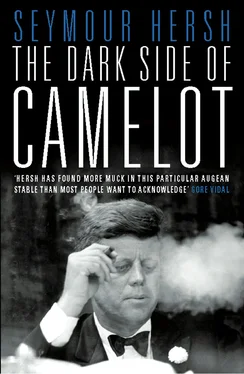Those newspaper stories were wrong. The full story—that is, as much as could be obtained for this book—is far more dramatic.
The uncensored versions of Hoover’s reports to Bobby Kennedy, made available in full for this book, reveal that Alicia Darr posed an extreme danger to Jack Kennedy in 1960, a danger that was hidden by deletions FBI censors made in the documents released in 1977. The uncensored versions reveal that Darr was well known to federal authorities and the New York police as a high-priced Manhattan prostitute and madam. The documents Hoover forwarded to Bobby Kennedy reported that in 1951, the year she first met Jack Kennedy, Darr was operating a “house of prostitution” in Boston. She moved to New York City a year later, where she turned again to prostitution, the FBI said, and also “was blackmailing people involved in the ‘Jelke case’”—a highly publicized 1952 sex scandal involving New York’s café society. The scandal led to a three-to-six-year jail term for Minot Frazier Jelke III, the twenty-three-year-old heir to an oleomargarine fortune, who was found guilty of procuring. * By 1953 Darr, described as a “talented prostitute,” was operating “a call girl service” in midtown New York, the unexpurgated FBI report said. Another of the FBI documents depicted her as “a notorious, albeit high-class, ‘hustler.’”
Darr’s marriage to Purdom was in shambles by December of 1959, when she sued him in Rome for assault, battery, and nonmaintenance. She was out of money by early 1960 and, according to contemporary European newspaper accounts, began writing bad checks, for which she was eventually arrested and briefly jailed. In September 1961, a month after she was granted a divorce, in Mexico, Darr’s finances improved dramatically: she married Alfred Corning Clark, a millionaire heir to the Singer sewing machine fortune. It was her second and his sixth marriage. Alfred Clark died of a heart attack in upstate New York thirteen days later, leaving her the bulk of his $10 million estate.
Alfred Clark’s other surviving heirs quickly challenged his state of mind at the time he wrote the will. Simon Metrik, who had since 1958 been Alicia Darr’s lawyer and media adviser, throughout her marriage to and divorce from Purdom, was retained on her behalf to handle the Clark family’s protests. (He later said that he also twice kept her from getting arrested for prostitution, following two New York City vice raids.) Darr and Metrik eventually quarreled, according to court documents, and she dismissed him in December 1961, whereupon Metrik submitted a bill for $1.2 million. Darr, outraged, refused to pay. During the legal skirmishing over his fees, Metrik filed a bill of particulars against Darr, which described what a New York court would later characterize as “the commission of a contemplated crime.” Darr’s new attorneys argued that Metrik, in his papers, had violated the rules of attorney-client confidentiality; they asked the Appellate Division of the New York State Supreme Court to initiate disciplinary proceedings against him and against his partner, Jacob Friedman, who was acting for Metrik in the fee dispute with Darr.
The Appellate Division found in favor of Darr’s new lawyers: Metrik and Friedman, it ruled, had breached the attorney-client privilege in their bill of particulars against Darr. On June 4, 1963, the two attorneys were publicly censured, and the file in the case was sealed. Metrik and Friedman were subsequently disciplined by the New York Bar Association. The two attorneys are deceased, and their firm disbanded; their file remains sealed today. * In its ruling, the Appellate Division noted that Metrik and Friedman’s “disclosure here on the intended crime was not made to prevent the act or to protect those against whom it was threatened. It was made long after the alleged occurrence” and was “not connected, even remotely,” with issues arising out of the Clark inheritance. Alicia Darr Clark kept her inheritance, and Metrik did not receive his $1.2 million fee.
What was the “contemplated crime” cited by Metrik and Friedman? Hoover’s memorandum to Bobby Kennedy—in the version released in 1977—provided some clues; Kennedy received it on June 4, 1963, the same day the New York court announced its censure of Metrik and Friedman for their bill of particulars. Hoover reported that his sources had been told that Alicia Darr had in her possession letters signed by John F. Kennedy and photographs proving that the two had had a relationship. Hoover, as the press reported in 1977, wrote that Darr had initiated a lawsuit against Kennedy before the inauguration and that Bobby Kennedy had allegedly gone to New York and settled the matter for $500,000.
Hoover’s information was apparently wrong. No record of a Darr lawsuit against Kennedy has been found, nor is there any evidence that the Kennedys paid anything to quash such a suit. A number of Jack and Robert Kennedy’s former associates, contacted by reporters in 1977, denied any knowledge of a $500,000 payoff and expressed doubt about the accuracy of the FBI report. Hoover may have been wrong about the lawsuit, but there is much evidence that Darr tried for years to extort money from the Kennedy family.
Alicia Darr did have money problems in early 1960, at exactly the time the presidential campaign was in full bloom, and she did worry the candidate. On April 8, 1960, three days after the disappointing Wisconsin primary, Kennedy drafted in pencil a two-page memorandum for the record—made public for the first time in this book—summarizing a conversation with Bobby Baker, the secretary of the Democratic membership of the Senate and a proétgé of Lyndon Johnson. Baker met secretly with Kennedy and warned him that he had been approached by a New Jersey lawyer named Mickey Weiner and had been told that the wife of “a well-known movie actor”—Darr had not yet obtained her Mexican divorce—was willing to give Johnson an affidavit acknowledging an affair with Kennedy in return for $150,000. “Baker,” Kennedy wrote, “said he thought it was blackmail, and did not inform Johnson of the matter.” Baker may have been a Johnson protégé, but he was also a sometime playmate of Jack Kennedy; his loyalty to that part of Senate life and not to his mentor Johnson carried the day. Kennedy, obviously aware of the political danger posed by Alicia Darr, treated his memorandum as if it were a legal document; it was countersigned on the same day by Pierre Salinger, his press secretary, placed in an envelope, and sealed three days later by Salinger, as Salinger noted on the front of the envelope. The handwritten memorandum, still sealed, was found among the papers of Evelyn Lincoln, Kennedy’s personal secretary, after her death in 1995.
In a 1995 interview for this book, Bobby Baker said he did not recall the blackmail threat or the conversation with Kennedy about it, but he did have a sharp memory of Mickey Weiner: “He was a whorehound, a percentager. He was trying to get defense contracts.” Salinger said in an interview that he did not recall the document, or signing and sealing it.
Although there is no evidence of any blackmail payments to Alicia Darr, the Kennedy family did turn to Clark M. Clifford, the high-powered Washington lawyer, for help in a matter that may have been the same one Bobby Baker reported to Kennedy. * Clifford recalled in an interview for this book being asked by Kennedy to handle what he depicted as an “extraordinarily dangerous” situation in the spring of 1960, a few months before the Democratic convention. It involved a woman “who could destroy him,” Clifford told me. “I had a conversation with Jack Kennedy that was so dramatic that if I could live to be a million years old, I could never forget it.” The senator had gotten involved in a “very sensitive matter,” Clifford said. “Public knowledge [of it] could have blown the Kennedy nomination out of the water.”
Читать дальше












